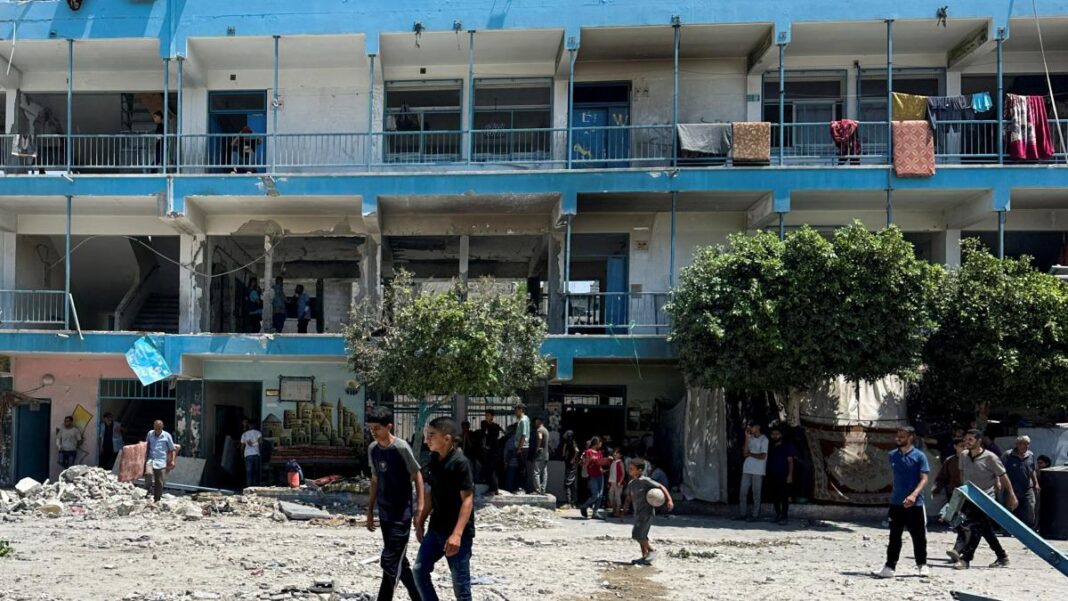BTN News: In a devastating escalation of the ongoing conflict, more than 100 people lost their lives, and dozens sustained injuries during the early hours of Saturday following a targeted bombing by the Israeli Army on a school in Gaza City, according to reports from Gaza’s authorities, which are under the control of the Islamic Resistance Movement, Hamas. The strike, which occurred while displaced individuals sought refuge and engaged in dawn prayers within the Al Tabin school, has been described by Gaza’s government as a “horrible massacre.” This incident has not only further fueled the already intense violence but has also sparked widespread outrage and condemnation. The tragedy, which unfolded amid one of the most severe humanitarian crises in the region, highlights the catastrophic impact of the ongoing military operations on civilians and the relentless cycle of violence that has plagued the area for decades.
Gaza’s government has accused the Israeli Defense Forces (IDF) of directly targeting the Al Tabin school, located in the Al Daraj neighborhood of eastern Gaza City. This school was being used as a refuge by numerous displaced families, many of whom were caught in the crossfire while performing their morning prayers. The aftermath of the bombing has left rescue teams scrambling to recover bodies, with the rising death toll making it increasingly difficult to retrieve all the victims.
In a forceful statement released via Telegram, Gaza’s authorities condemned the attack, calling it a clear act of genocide and ethnic cleansing against the Palestinian people. The government in Gaza placed full responsibility for the massacre on Israel and the U.S. administration, urging the international community to respond decisively to what they described as a blatant violation of human rights.
On the other side, the Israeli military has acknowledged the airstrike on the school but justified the attack by stating that the facility was being used as a “military headquarters” by Hamas. According to a statement from the IDF, the strike was carefully coordinated with intelligence inputs from the Shin Bet and the Southern Command, targeting what they described as “terrorists” who were allegedly operating from within the school complex. The IDF claimed that these operatives were using the location to hide and plan terrorist activities against Israel, thus necessitating the attack.
The Israeli military further defended its actions by asserting that numerous precautions were taken to minimize civilian casualties, including the use of precision weapons and advanced intelligence methods. However, they also criticized Hamas for what they termed as systematic violations of international law, accusing the group of using civilian infrastructure, such as schools, as shields for their operations.
Earlier on the same day, additional airstrikes by the Israeli military resulted in the deaths of at least eight civilians in the Nuseirat and Deir al-Balah refugee camps within Gaza. In Nuseirat, a family home was struck, leading to the deaths of four individuals and causing significant injuries and damage to neighboring houses. Another attack in the southern part of Nuseirat left four more people injured. In Deir al-Balah, a strike on a tent near a school resulted in the deaths of four more civilians.
The escalating violence has brought the humanitarian crisis in Gaza to a critical point. According to the latest figures from Gaza’s Ministry of Health, which is under Hamas control, the military offensive launched by Israel following the attacks on October 7 has so far resulted in 39,699 deaths and 91,722 injuries in Gaza alone. The October 7 attacks themselves, which prompted Israel’s retaliatory campaign, left approximately 1,200 Israelis dead and around 240 individuals kidnapped by Hamas.
The conflict’s ripple effects are being felt beyond Gaza as well. In the West Bank, including East Jerusalem, around 600 Palestinians have been killed in Israeli military operations and attacks by settlers since the conflict intensified. In Lebanon, approximately 500 people have died, and over 1,500 have been injured due to Israeli airstrikes, according to Lebanon’s Ministry of Health.
The continued escalation of violence and the rising civilian death toll highlight the dire need for international intervention to prevent further loss of life and address the underlying causes of the conflict. The global community faces increasing pressure to mediate a ceasefire and push for a peaceful resolution that considers the rights and safety of all civilians caught in the crossfire.


